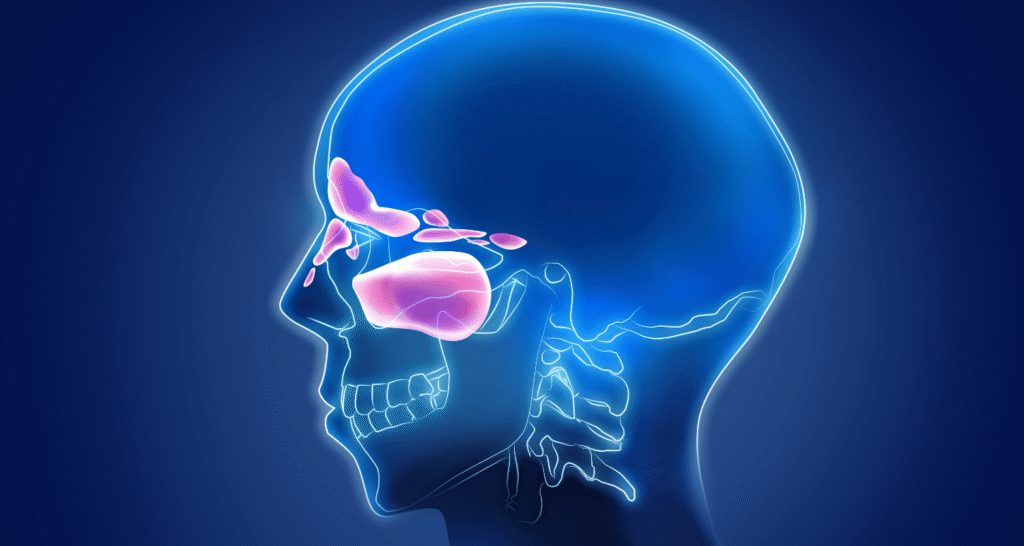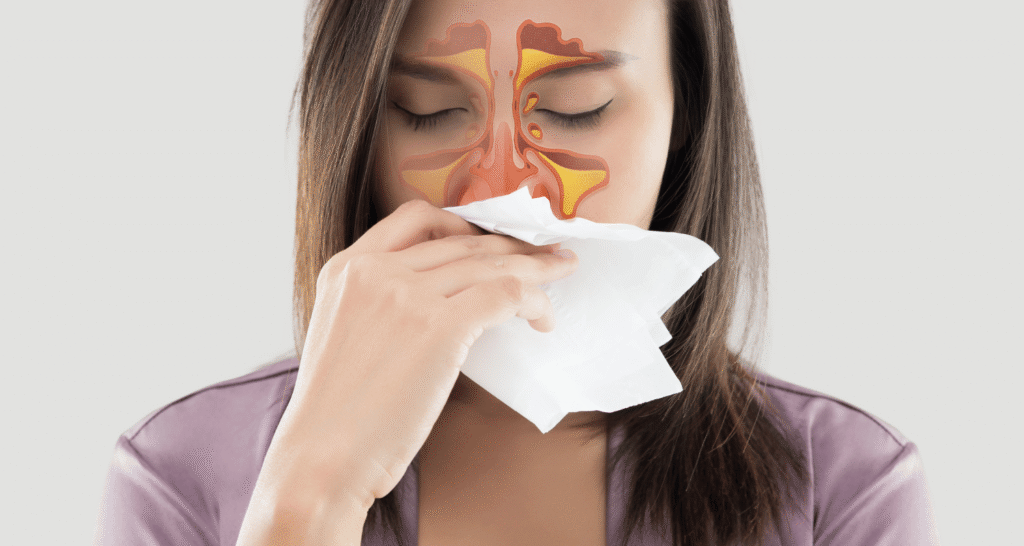Can Sinus Cause Toothache Pain?
Toothaches are not necessarily a symptom related to the mouth. There are times when what seems like a toothache could be a result of a sinus infection. If you’re wondering can sinus cause toothache pain, the answer is yes. When your sinuses get swollen or infected, the result is the development of pressure in the sinus cavities above the upper teeth. This pressure is capable of simulating the pain of the teeth, and this is usually realized in the upper molars.
It is important not to confuse tooth pain that might be caused by sinusitis with real problems in the teeth, to prevent unnecessary treatments for the teeth. Dentists often receive customers who visit them to discover that their discomfort was a result of a sinus infection.
Being familiar with this relation between sinus infection and tooth pain enables you to make sound decisions. In this blog, the author will discuss how a toothache can be a symptom of sinus after all, and how to differentiate between the symptoms of sinus and teeth problems, and how to make them go away.
Can a Sinus Infection Cause Tooth Pain?
That is true, tooth pain may also be caused by a sinus infection, especially on the upper back teeth. This is so because the molars have their roots near the Maxillary sinuses. When such sinuses are inflamed or filled with fluid, they strain the nearby nerves and thus send sensation akin to a toothache.
- Close sinus-tooth proximity
- Inflamed sinus pressure
- Nerve pain mimicry
What’s the Difference Between Sinus and Toothache Symptoms?
It is difficult to distinguish between a real toothache and pain in the sinuses. The toothaches are typically mild and sharp pain in the sinus region, tending to spread to many teeth, accompanied by the nuisance of increasing pain when you bend your head forward or straighten it. Characteristic of actual dental pain are its sharpness, its discreteness, and its invariance to movements of the head.
- Sinus pain = dull & widespread
- Toothache = sharp & localized
- Head position affects sinus pain
What Are the Symptoms of Tooth Pain from Sinusitis?
Sinusitis tooth pain is usually associated with other symptoms of the sinuses. You might experience pressure in the face, stuffiness in the nose, a runny nose, sputum, or even a slight fever. The pain worsens when one is flying or travelling during the season when there are allergies, and it is usually located on the upper side of the molars.

- Facial tenderness
- Eyes pressure
- Pain of upper molars
How to Relieve Tooth Pain from Sinus Pressure?
Tooth pain due to sinus pressure is one of the conditions you can alleviate with several at-home solutions and over-the-counter drugs. However, if the pain persists, it may indicate a dental issue requiring professional care, such as a toothache. Steam inhalation, nasal spray, and antihistamines or decongestants relieve the pressure in the sinuses and, therefore, the pain in the tooth.
- Steam inhalation
- Nasal saline wash
- OTC decongestants
What Is the Best Pain Relief For A Sinus Toothache?
The most effective over-the-counter sinus toothache treatment is aimed at the elimination of the inflammatory effect and the pressure. Nonetheless, drugs such as ibuprofen (NSAIDs) help decrease inflammation, whereas decongestants are used to remove the sinus congestion. In extreme conditions, your physician can also prescribe corticosteroids or appropriate antibiotics in case the infectious organism is of bacterial origin.
- Acetaminophen or ibuprofen
- Nasal decongestants
- Prescription medications
Can Sinus Pressure Points Help Tooth Pain?
Yes, sinus acupressure is beneficial for sinus congestion and tooth pain by applying pressure over the sinus acupressure points. To achieve facial draining and facial pressure relief, massaging the eyebrow regions, the nose bridge, and under the cheekbones may help dissolve the congestion.
- Nose-bridge massage
- Press cheeks softly
- Above eyebrows rub
How to Get Rid of Sinus Toothache Pain Quickly?
A heat, fluid, and decongestant drug combination will provide instant relief of sinus-type pain in the teeth. You can soothe your face with a warm compress to loosen mucus and keep yourself hydrated in order to make your sinus secretions thin and encourage their drainage.
- Warm compress
- Consume more fluids
- Nasal spray
When Should You See a Dentist for Tooth Pain?
In case your toothache does not disappear when your sinus symptoms disappear, you need to visit a dentist for emergency dental care. The persistent pain, even when it is localized, swelling around a particular tooth, or tooth sensitivity to temperatures, can indicate a problem with the teeth and not a sinus infection.
- Persistent pain
- Single tooth anesthetized
- Swelling or redness of the gums
Also See: Excessive Gum Bleeding
Can a Dental Issue Cause Sinus Problems Too?
Yes, the dental upper molar infections can extend to the maxillary sinuses, resulting in a condition called odontogenic sinusitis. It is an opposite scenario in which a tooth problem causes sinus problems rather than vice versa.
- Infection of the molar teeth
- Inflammation of the sinus begins
- Requires dental care
What Are Dental Sinus Infection Symptoms?
Infection of the sinuses of the teeth usually starts with pain in the tooth, and then follows a runny nose, blockage of the sinuses, or facial swellings. Contrary to ordinary sinusitis, the problems can flare up during the process of chewing and have a particular infected tooth as the source of origin.
- Chewing pain
- Nasal drainage of foul odour
- Facial swelling

Can Allergies Cause Sinus Toothache Pain?
Yes, the sinus may get inflamed and clogged due to allergies, and in this case, a toothache can result. The sinus can swell, especially in situations of seasonal allergies, resulting in increased pressure around the nerves in the area of the upper molars and subsequent dull aching pain.
- Pollen sensitivity
- Pressure occurs due to congestion
- A toothache follows this
How Long Does A Sinus Toothache Last?
When the sinus infection clears up, a sinus toothache will normally disappear and this may take a few days or a couple of weeks. Sinus infection can also be chronic leading to syndrome that needs healthcare attention.
- A couple of days to 2 weeks
- Gets better with treatment
- Chronic cases persist.
Is It Safe to Ignore Sinus Tooth Pain?
In mild increasing pain involving teeth due to sinus pain, ignoring the symptoms may be okay, but continuing and progressive pain should be investigated. Chronic sinusitis may result in complications such as abscesses and even persistent infections that involve the adjacent teeth.
- Watch symptoms
- Consult a doctor when it gets serious
- Never overlook the changes
What’s the Link Between Sinus Infections and Upper Teeth?
The roots of the back teeth, particularly of the molars, are extremely near the floor of the maxillary sinuses. Pain originating at such roots is more likely to occur when these sinuses are infected and the pressure or fluid buildup causes irritation to the roots, which subsequently causes pain resembling a dental problem.
- Shared anatomy
- Root proximity
- Inflamed sinus effects
Conclusion
The most important thing is to learn how your teeth relate to your sinuses in case you want to seek perfect treatment. Although tooth pain associated with sinus problems is mendacious and most of the time temporary, pay attention to your symptoms. In case the pain persists even after your sinus problems get fixed, you need to visit a dentist, in case dental reasons are the cause. Proper diagnosis saves time, pain, and wasted procedures.
FAQs
How do I relieve sinus pressure in my teeth?
In order to alleviate the pressure of sinus in your teeth, you can clear the clogged sinus by using steam inhalers, a nasal spray, or decongestants. Keeping yourself hydrated and applying warm compresses is also a good way of alleviating the pressure to get relief.
How do I know if my tooth pain is from my sinuses?
In case the discomfort involves multiple upper teeth, it becomes worse with a bent body posture, and it is combined with symptoms of sinus, such as congestion or facial pressure, it is probably sinus-related. Dental pain localizes to one tooth.
What is the 3-3-3 rule for a toothache?
The 3-3-3 rule proposes that taking 3 (ibuprofen 200 mg) times every 3 hours on three consecutive days or as recommended by a health care professional is appropriate. It is commonly applied in the treatment of dental inflammations and pain temporarily.
Can sinus pain in the teeth be unbearable?
Sinus pain in the teeth is indeed painful and can be so much that it overwhelms the person, especially when pressure in the sinuses is immense or when there is an infection. The dull, but burning pain that radiates is not typically acute and may become unbearable without treatment.
